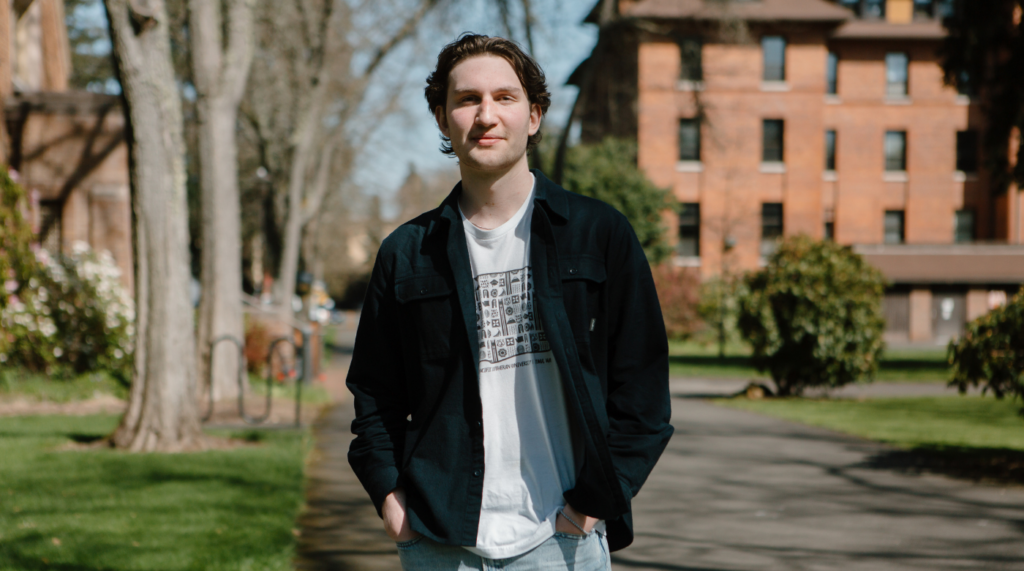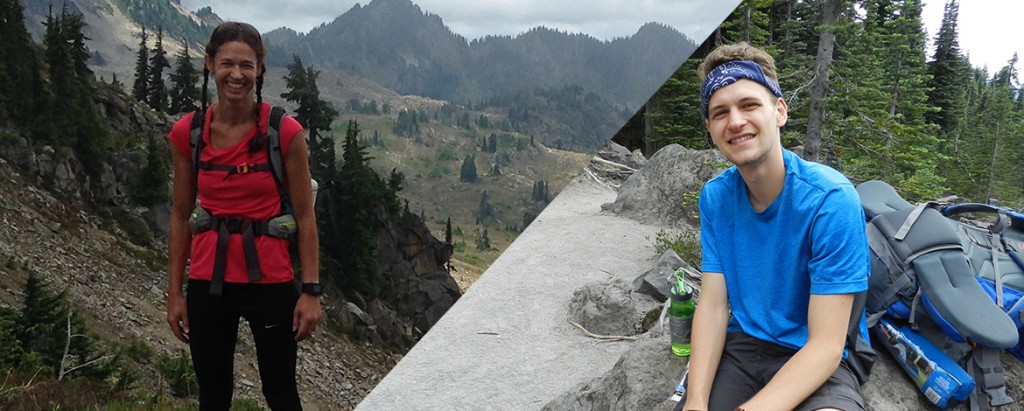Page 67 • (711 results in 0.06 seconds)
-

Parker Brocker-Knapp ’23 grew up in Portland, but Puget Sound never seemed far—thanks to close family ties to PLU. We sat down with Brocker-Knapp to learn more about how this senior made the most of his time at PLU. How did you choose PLU? I…
through the process, including a mock interview. Faculty are very committed to our success in that way.Hispanic & Latino Studies at PLUThe PLU Hispanic & Latino Studies combines the study of the Spanish language with courses in Latin American, Latino, and Iberian literatures, linguistics, and cultural studies.Why did you choose Hispanic Studies as a major? I was lucky enough to experience a dual-immersion school program from kindergarten until 10th grade, spending half of every day learning Spanish
-

Highly recruited as an outside hitter out of Chiawana High School, Sianna Iverson ‘24, a talented volleyball player, knew she found a home at PLU after a campus visit. “As soon as I visited, I knew it was going to be a great fit for…
persistence and learning in the training room and classroom, Iverson relentlessly pursued accolades and resume boosters while on campus, including the 2023 American Kinesiology Association PLU Undergraduate Scholar of the Year Award recipient, NCAA Women’s Enhancement Graduate Scholarship recipient, Student-Athlete Advisory Committee representative, Vice President of the Kinesiology of the Future Club, Kinesiology tutor, and has become a Certified Strength and Conditioning Specialist. Most recently, she
-
Dr. Samuel Torvend spent his sabbatical during the 2019-20 school year researching environmental consciousness and sustainability in early medieval monastic communities. Early medieval monasteries were built to last, he emphasizes. “When these monastic communities were established, they did not think they were going to be…
ways the diets of medieval Benedictines were very different from those of the average modern-day American. “It’s good to remember,” said Dr. Torvend, “that the lives of these communities were guided by the daily motion of the sun and moon, by the changing seasons of the year. They did not fly pineapples in from Hawaii or Costa Rica and hothouse tomatoes from Canada. They lived with what we would call a macrobiotic diet: a diet that would change with what was available at different times of the
-
Originally published in 2021 Dr. Samuel Torvend spent his sabbatical during the 2019-20 school year researching environmental consciousness and sustainability in early medieval monastic communities. Early medieval monasteries were built to last, he emphasizes. “When these monastic communities were established, they did not think they…
that focused on environmental ethics.In many ways the diets of medieval Benedictines were very different from those of the average modern-day American. “It’s good to remember,” said Dr. Torvend, “that the lives of these communities were guided by the daily motion of the sun and moon, by the changing seasons of the year. They did not fly pineapples in from Hawaii or Costa Rica and hothouse tomatoes from Canada. They lived with what we would call a macrobiotic diet: a diet that would change with
-

In her free time, professor of religion Dr. Bridgette O’Brien likes to participate in ultrarunning—completing runs longer than a marathon (26.2 miles). While Professor O’Brien is out on the trail, she often takes that time to think about her connection to the outdoors, a connection…
think one of the exciting things about research is that there are innumerable possibilities,” she says. “My hope is this trope of Dark Green Religion can be more robust, can become more inclusive.” Professor O’Brien and Collin Ray will present their research in May 2018 at the American Academy of Religion regional conference being held at PLU. Helen Smith is a PLU junior, with a major in Communications (Journalism concentration) and minor in English Writing. She completed this article as part of her
-
Global health: Why does it matter? If public health was a fashion show, global health would be the new black. It’s hot. But what is global health, exactly? And why does it matter? Mark Twain once complained that everybody talks about the weather but nobody…
Summit. Billed as a global health conference dedicated to using science and technology for the betterment of the world, it has been mostly focused on expanding biomedical innovations in upper- and middle-income Asian nations. In short, it’s about selling American biomedical technology and expertise overseas. That’s fine, insofar as it goes, but the biggest problems in global health are among people who live on maybe a dollar or two a day. They won’t be buying too many of our new drugs, DNA testing
-

TACOMA, Wash. (May 23, 2019 ) — Judging by its accomplishments, Pacific Lutheran University’s Class of 2019 is poised to make an immediate impact on the world — mostly because they already have done so much at PLU. Here’s a look at just a handful…
situations that will help you grow to your greatest potential and accomplish your goals.”Nelago NuunyangoMajor: Political Science, with a minor in Literature Hometown: Epato village, Namibia Selected accomplishments: Graduation Honors (magna cum laude); PLU Q Club Scholarship; PLU Academic Scholarship; First in Family Scholarship; Donald R. Farmer Award; Lutheran Leadership Award; Sigma Tau Delta English Honor Society; Phi Theta Kappa Honor Society Post-graduation plans: Pursuing graduate study in
-

TACOMA, WASH. (May 15, 2017)- Classes are over, tests are on the horizon and therapy dogs are waiting in the wings. It’s the end of spring semester, and for several hundred Lutes that means life after college beckons. Pacific Lutheran University students are fast approaching…
prepare high school students for college. Horn expects to hear back about the opportunity by May 20. In the future, Horn sees himself becoming a teacher. At the moment, his end goal is to teach English and find a way to incorporate literature and film in the classroom. While his time at PLU challenged him, Horn suspects it’s only the beginning. He anticipates leaving the PLU community will be an adjustment post graduation, but he’s ready. “Maybe the most challenging thing hasn’t come yet,” he said
-

Isaiah Banken ’21 knew he wanted to pursue a career in medicine. Banken, with a B.S. in biology and a minor in mathematics from PLU, explored various medical opportunities near his hometown of Wenatchee, WA, including working at a ski resort, serving in hospice care,…
Washington School of Medicine, I traveled extensively before starting school in July of this year. What are some of your fondest memories from PLU? IB: I was on the PLU Men’s rowing team for three years. The sunrises and the foggy mornings on American Lake are very memorable. Other moments like running on the golf course, eating dinner with my friends in Red Square in the fall, and the PLU Christmas concert are also up there. In my first year, it snowed just enough, so my friends and I built a jump and
-
Next of kin: the ethics of eating, capturing, and experimenting on great apes One of the pressing problems of our times is the future of the great apes. All of the great apes – chimpanzees, bonobos, gorillas and orangutans – are endangered. Their habitat is…
apparent differences have led us, more often than not, to believe ourselves more important than other species. “At CHCI I learned to care for the family of four chimpanzees who live there: Washoe, Tatu, Loulis and Dar. All are famous for acquiring elements of American Sign Language, which they use on a regular basis to communicate with each other and with their human companions. Washoe, Tatu and Dar were raised as deaf human children by human ‘parents,’ while Loulis learned from other chimpanzees
Do you have any feedback for us? If so, feel free to use our Feedback Form.


